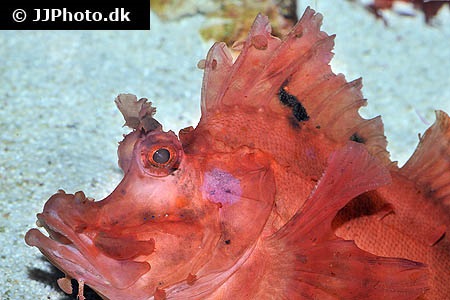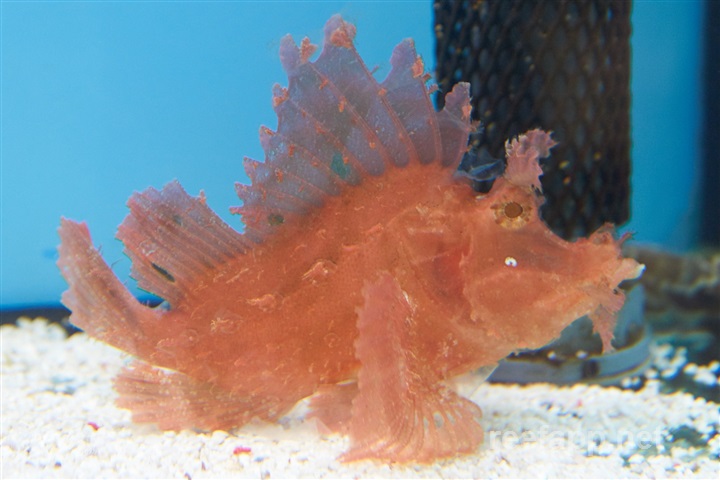Rhinopias eschmeyeri


| Latin name | Rhinopias eschmeyeri - Condé, 1977 |
|---|---|
| Local name | Eschmeyer's scorpionfish |
| Family | Scorpaenidae - Rhinopias |
| Origin | East Indian Ocean, West Indian Ocean, Australia, Japan, Indonesia, New Zealand, Central/West Pacific |
| Max length | 23 cm (9.1") |
| Minimum volume |
100 l (26 gal) |
|---|---|
| Hardiness |
Delicate |
| Suitable for aquarium |
Experience, preparation and extra care required |
| Reef safe |
Reef safe with caution |
| Aggressiveness | Peaceful |
| Recommended |
Fish Larger crustaceans (Shrimp, crabs...) |
|---|
This species can be kept in a small tank, if it is specifically equipped to meet its needs.
It is recommended however, to keep it in an aquarium which is larger then described above.
This species is highly venomous and this venom can, under certain circumstances, be fatal.
In case of poisoning, it is vital to have as much information as possible regarding the species/poison. Have telephone number for the poison hotline close to the aquarium.
Since people can have different reactions to poisons, take precautions necessary to ensure your safety and that of your surroundings.
This species is very sensitive during transportation and acclimatizing into the aquarium.
These fish prefer live feed, such as live fish or shrimp. Some specimens refuse "dead" food altogether, while others can be trained to accept it.
Its easiest to move the frozen food around in front of the fish with a pair of tweezers. As soon as the fish shows interest and “attacks”, let go of the food.
They will try to eat all fish, shrimps and similar life forms that are small enough to fit in itheir mouth.
They should be fed a couple of times a week.
The fish and shrimps used as foods, must remain whole to give the Lionfish the optimum nutrition. The food must not be thawed naturaly, this helps to retain all the goodness.
Suitable live food are: Mollies, Guppies and Ghostshrimp. The feeder fish or shrimp should be fed with nutritious feed, like Cyclop-eeze for example.
To avoid getting parasites this species changes its skin, this is nothing to worry about. During the process the eyes can become a little opaque.
This type of Scorpionfish is considered by many to be the most exclusive, which is duly reflected in the price.
It is very prone to infection, so it is important to be familiar with treatment of various infectious deseases.
Scorpion-/Lionfish (Scorpaenidae) are both pretty and interesting because of their special appearance and behaviour.
They are generally hardy and do not need a large swimming area, but do often require feeding with small live fish and/or shrimps. Some will quickly begin eating frozen fish or shrimp whilst others will refuse to eat "dead" food. Their food must be highly nutritious and varied. They must not be fed too often. Feed them a large meal twice a week.
These fish are mostly peaceful, but will eat anything that fits into their mouth. One might be surprised by how large their prey can be, they can even swallow fish which nearly match their own length. They will also eat each other, if the size difference is large enough. Their venomous spines do not guarantee that they will not be eaten by other predatory fishes.
Do be cautious when having your hands in the aquarium as these fish are very poisonous.
Some Scorpionfish require a special substrate, either coral gravel or fine sand, as this resembles their natural habitat.
Be careful when catching Scorpion-/Lionfish as they can easily get caught in the net.
| Aquarium trade | Yes |
|---|---|
| Distribution | Indo-West Pacific. |
| English common names |
Eschmeyer's scorpionfish |
| French common names |
Poisson-scorpion d'Eschmeyer Rhinopias d'Eschmeyer |
Scott Michael. 2003. Aquarium Fish: The Rhinopias Spp. – The Ultimate Scorpionfishes - Advanced Aquarist - (English)
Scott W. Michael. 2001. Reef Fishes volume 1 - TFH Publications / Microcosm Ltd. - (English)
Henry C. Schultz. 2002. Scorpionfish: Masters of Camouflage - Reefkeeping Magazine - (English)
Greg and Renee Hix. Scorpionfish in the Home Aquarium - Lionfish Lair - (English)
Greg and Renee Hix. Lionfish in the Home Aquarium - Lionfish Lair - (English)
Daniel Pomfret- 2007. Venomous Beauties: A Look at Scorpionfishes in the Home Aquarium - Tropical Fish Hobbyist Magazine - (English)

